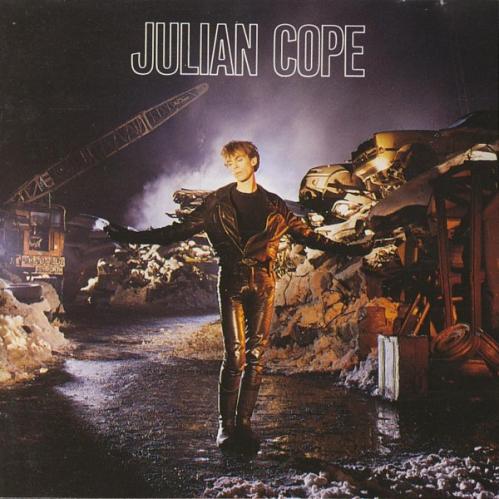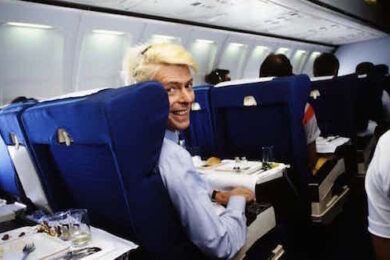For many people, this is the best-known Julian Cope album. Not for them the recent 72 minute single-track-synth-drone-meditation ‘Woden’, or the acoustic campfire whimsy of ‘Skellington’. Saint Julian had (modest) hit singles, and with a major label marketing budget probably exceeding the recording costs of his last five albums, was pretty high profile. And it’s a mostly good album, if a little dated sonically. Despite lacking the unified themes of later works like Peggy Suicide or Autogeddon, the simple riff-based garage rock with a pop sheen works well to produce a solo career high in terms of commercial appeal.
It marks a transitional phase in his career. After the demise of The Teardrop Explodes, his first two solo albums met with little success. Cope had retreated to Tamworth, obsessing over his collection of toys and honing his general paranoia. His first solo album, World Shut Your Mouth, featured fine songs like ‘Strasbourg’, ‘Kolly Kibber’s Birthday’ and ‘Greatness and Perfection’, but was not a success. Fried, released later the same year and featuring the stunning ‘Laughing Boy’ and ‘Me Singing’, remains one of his finest works, although sales figures suggest few were listening at this point. Saint Julian marked a change in record company and a poppier direction bringing wider commercial interest, ultimately leading to My Nation Underground, his least enjoyable and most overproduced album. Although the recording sessions for the latter appear to have been traumatic for Cope, it was a pivotal time as he secretly recorded Skellington shortly afterwards, followed by Droolian and then his mighty trilogy of Peggy Suicide, Jehovakill and Autogeddon. By then Cope had transformed from would-be pop star to Archdrude, and had also shown his particularly fine gifts as a writer with the publication of Head-On, his first volume of autobiography.
But back to 1987. This was Cope’s first solo album that was recorded by a band who’d toured the material first and it shows. Fondly referred to as the Two Car Garage Band in the second part of his autobiography, Repossessed, they were tight, held together by James Eller’s impeccable bass and Chris Whitten’s drums, with guitar from longtime sideman Donald Ross Skinner. Cope provides more guitar and keyboards, although the latter was under a pseudonym, apparently so as not to appear uncool. Some of the sessions were run by Ramones producer Ed Stasium, eminently suited to the sound Cope was after, with Warne Livesy handling the remainder. Despite having two producers, the album sounds mostly cohesive.
There are two main types of song here. Firstly, three great singles in ‘Trampoline’, ‘Eve’s Volcano’ and ‘World Shut Your Mouth’ (evidently Cope liked the title enough to recycle it from his first album, which probably led to a few confused purchases). The latter tune in particular is superb, especially in the drawn out live version he played at the time, and it’s a mystery why it didn’t make the top 10.
Secondly, there are several tracks that lay down a killer riff then iterate til the chorus – ‘Shot Down’, ‘Spacehopper’ and ‘Pulsar’ (memorably described by Cope as "a primal headbanger of such base Odinist proportions that even the lead vocal follows the melody of the guitar and bass, like some one-handed punk Yardbirds"). Played live, without the gloss of the studio sound, these tracks are brilliantly dumb rock; here they have enough polish to sit happily among the singles. ‘Planet Ride’ is not good, however – perhaps a decent demo exists somewhere but this version is overproduced with hideous synth bass ruining what might be another good riff if recorded in a different decade. The synth bass solo is unambiguously the low point of the album.
Finally, the other songs showcase slightly more developed melodies. Title track Saint Julian is an early indicator of Cope’s unfavourable attitude to religion, opening mildly with "I met God in a car in a dream in Ankerside, and I was very unkind" before detailing acts of violence against the rejected deity. This idea would be more fully developed in the unambiguously titled Jehovakill a few years later. ‘Screaming Secrets’ is similarly melodic, but built on another killer riff, and the album ends with ‘A Crack In The Clouds’, a relatively lush acoustic guitar and strings number.
The album’s main weakness is the drum sound. The mid-80s was an unkind era for audio production, with a lot of releases from that period sounding very dated now, and there’s no doubt the album would be improved with a bit more dirt and a lot less reverb. Still, for those with fond memories of the original, this will be an appealing package.
Accessible Cope is always backed by weird B-sides, and the second CD here collects a bunch of these from this era. There are raucous tracks like ‘I’ve Got Levitation’, ‘Non Alignment Pact’, and ‘Umpteenth Unnatural Blues’ that are at least as good as some of the ones on the album. ‘Disaster’, ‘Mock Turtle’ and ‘Warwick The Kingmaker’ sound more like they belong on Fried, no bad thing. Less enjoyably, there are also a few 12" mixes of the singles. These sounded pretty awful at the time, and haven’t aged well. Finally, a couple of live versions show how much better this band sounded out of the studio. In many ways, a case could be made for this being the superior disc – it’s less consistent and the lows are much lower, but both the strangeness and the energy make for a compelling listen.
If you liked Saint Julian first time round, this is definitely worth buying. There are superior albums in Cope’s catalogue, but probably nothing this accessible, and the second disc is a worthwhile addition to a fondly remembered release.



